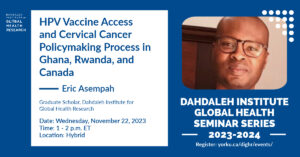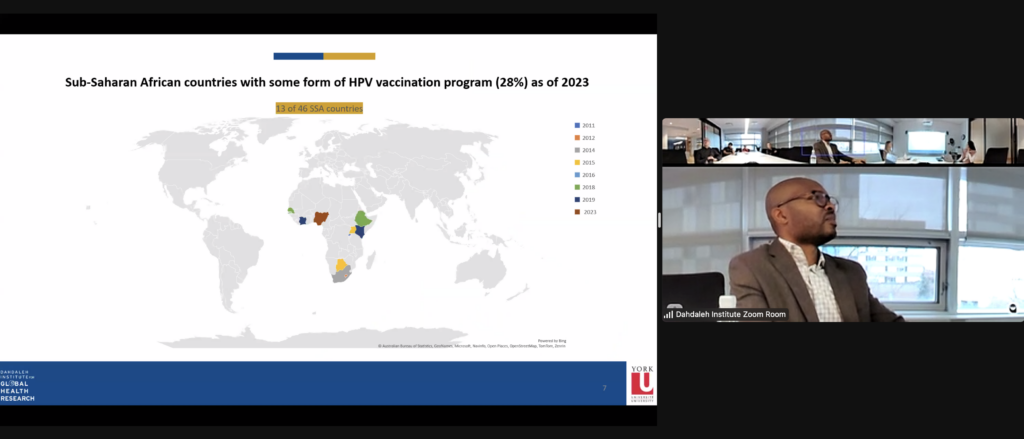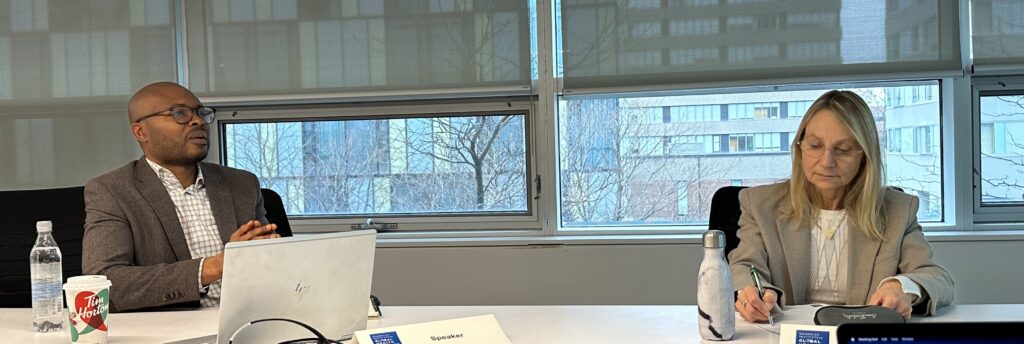Post
Published on January 31, 2024

On November 22, 2023, Dahdaleh graduate scholar Eric Asempah addressed the urgent global health issue of preventing human papillomavirus infection (HPV) related cervical cancer through prophylactic vaccines in low and middle-income countries.
Cervical cancer claims 342,000 lives worldwide, with sub-Saharan Africa being a major hotspot. Asempah highlighted that 99% of cervical cancer cases are linked to persistent HPV infection, and over 70% are attributable to high-risk HPV (strains 16 and 18). Less than 25% of low-income countries have introduced HPV vaccines in their national vaccination programs, in contrast to 85% of high-income countries. Despite some HPV vaccination programs in sub-Saharan Africa, Asempah explained that at the current rate of progress, it would take approximately 30 years to cover the entire sub-Saharan region with vaccines. A notable contribution by Asempah is the Policy Choice Stability Estimator, a predictive tool he created to aid policymakers in decision-making by analyzing trends, predicting outcomes, provide evidence for justifying new policies, and assessing cost-effectiveness.
Asempah presented a rational approach to prophylactic vaccines in Canada, Rwanda, and Ghana, where all three nations have some form of national health insurance and are in agreement with the WHO's ideal of universal health coverage. Rwanda and Ghana are able to access HPV vaccines through Gavi-assisted programs, while Canadian provinces receive assistance from the federal government. Additionally, the WHO aims to eliminate cervical cancer by 2030 through vaccination, screening, and treatment targets.
Lastly, Asempah proposed a roadmap for prioritizing HPV vaccination programs in low-income settings, suggesting regional collaboration strategies similar to COVAX to validate policymaker choices. He also highlighted the need for collaboration, since a significant number of researchers in HPV and cervical cancer do not reside in highly burdened regions.
Watch the seminar presentation below:
Connect with Eric Asempah
Themes | Global Health & Humanitarianism, Global Health Foresighting |
Status | Active |
Related Work |
N/A
|
Updates |
N/A
|
People |
You may also be interested in...
The Victor Dahdaleh Foundation to support University facilities, selected programming with $4M gift
The gift will support upgrades to the Victor Phillip Dahdaleh Building on York University’s Keele Campus, provide operating funding to CIFAL York and support a new operations facility for the Advanced Disaster, Emergency and Rapid Response Simulation ...Read more about this Post
Recap — AI for Health Equity: Transforming Global Pandemic Preparedness, with Jude Kong
On November 6, Dahdaleh faculty fellow Professor Jude Kong presented an overview of his work in developing and implementing decolonized Artificial Intelligence (AI) frameworks, particularly within public health contexts across Africa and the Global South. ...Read more about this Post
Groundbreaking global health simulation slated for May
Written by Elaine Smith Students will be immersed in an unparalleled learning experience on May 1 and 2 as York University’s School of Global Health unveils an innovative global health simulation event designed for Faculty ...Read more about this Post



